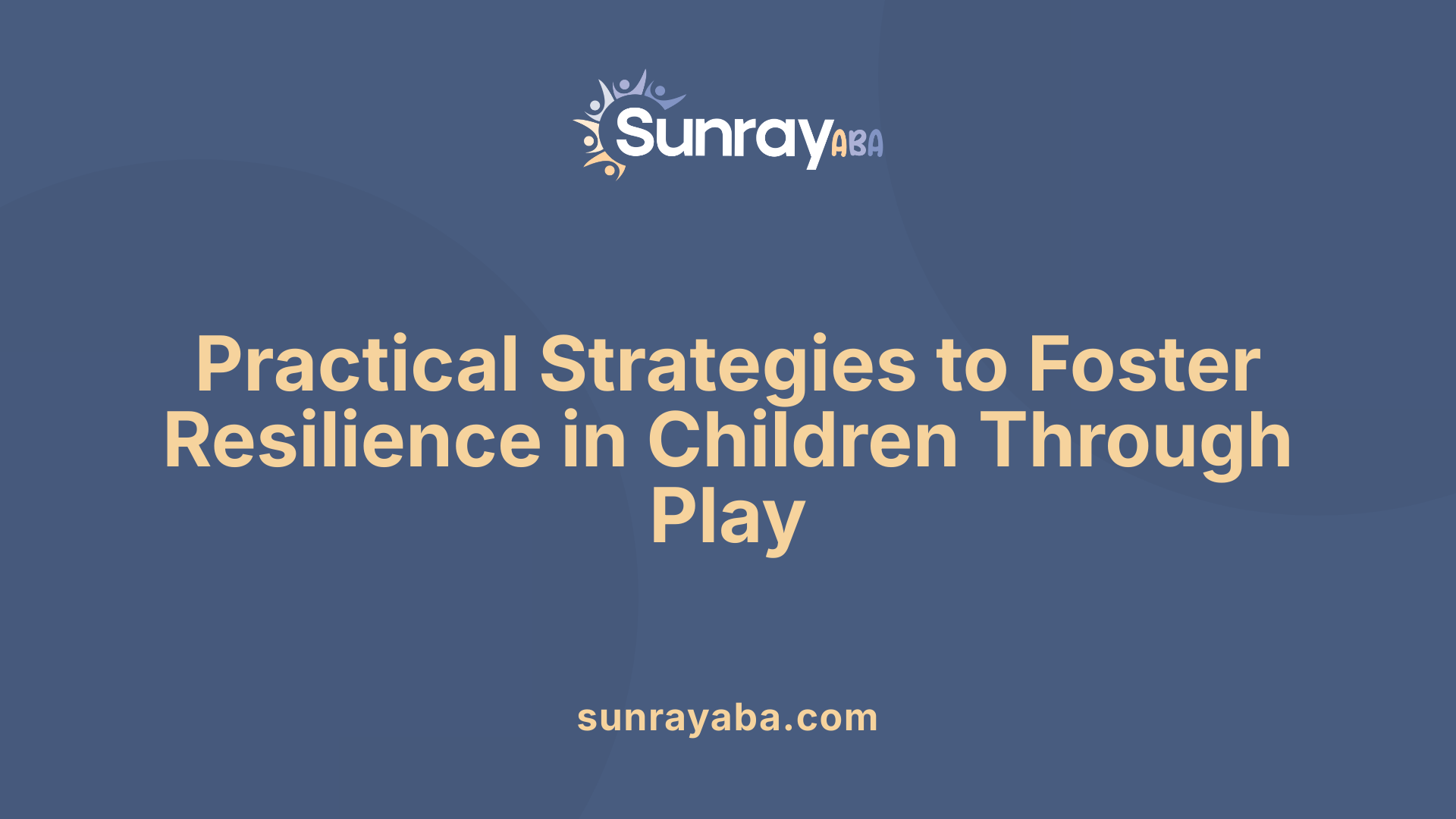Helping Kids Develop Emotional Resilience Through Play

Understanding the Power of Play in Emotional Development
Play is not just a childhood pastime; it is a fundamental process through which children develop critical social, cognitive, and emotional skills. Its role in fostering resilience—a child's capacity to recover from setbacks and adapt to challenges—is particularly significant. This article explores how various forms of play nurture emotional resilience, supported by scientific research, strategic practices, and therapeutic approaches.
The Foundations of Resilience Through Early Play
How does play help children develop emotional resilience?
Play is a powerful tool in fostering emotional resilience in children. It offers a safe and supportive environment where children can explore and express their feelings, including fears, frustrations, or sadness. Through imaginative and pretend activities, they can symbolize emotions and work through complex situations, reducing anxiety and building coping skills.
Engaging in play also enhances emotional well-being by helping children articulate feelings they might not yet have words for. This process supports emotional awareness and self-regulation, critical components of resilience. When parents or caregivers participate in play, it further strengthens the emotional bond, providing children with a sense of security, belonging, and love.
Additionally, play encourages confidence and problem-solving. Facing challenges in a playful context helps children learn that setbacks are part of growth and that they can try again. These experiences develop a growth mindset and adaptive strategies, making children better equipped to handle real-life stressors.
Overall, play is essential for emotional development. It nurtures mental health, encourages self-awareness, and builds the resilience needed for children to adapt, recover from setbacks, and thrive despite adversity.
Supportive Environments: The Role of Routine and Safe Spaces

Why is early childhood play important for developing emotional intelligence and resilience?
Early childhood play is fundamental in shaping a child's ability to understand, manage, and express emotions, which are core components of emotional intelligence. Through various playful experiences like storytelling, role-playing, and emotional games, children learn to recognize their own feelings and those of others in a safe setting. This exploration fosters empathy, enhances social skills, and builds self-awareness, which are crucial for resilience.
Play provides a natural platform for children to practice coping strategies, resolve conflicts, and establish positive social connections. These interactions, especially when supported by caring adults, help children develop secure attachments and emotional attunement. As they experiment with different scenarios during play, they learn how to manage frustration, disappointment, and other strong feelings effectively.
Activities that involve pretend play or role-play enable children to simulate stressful or overwhelming situations in a controlled environment. This rehearsal builds their confidence and resilience, teaching them that setbacks are part of growth. When adults model calm and supportive reactions during play, children learn calming techniques and emotional regulation skills.
Furthermore, engaging in playful interactions supports brain development, especially in areas linked to emotional control and problem-solving. Over time, these skills become internalized, helping children navigate challenges with perseverance and optimism. Ultimately, early childhood play not only nurtures emotional intelligence but also prepares children to face life's difficulties with resilience and adaptability.
Strategies for Nurturing Resilience: Play-Based Approaches
What strategies can parents and educators use to nurture resilience through play-based activities?
Creating environments that are both safe and engaging is essential for fostering resilience in children. Play environments filled with open-ended materials such as blocks, art supplies, and costumes invite children to explore freely, express emotions, and develop problem-solving skills. Outdoor exploration adds a rich sensory component, encouraging curiosity and physical activity.
Encouraging social play and cooperation helps children build strong peer relationships, which serve as emotional support systems. Cooperative social games and pretend play scenarios teach patience, flexibility, and how to work through conflicts.
Incorporating routines and opportunities for safe risk-taking into play supports children’s confidence and independence. Visual schedules and structured routines provide predictability, reducing anxiety and helping children learn to navigate new or challenging situations.
Supporting emotional development involves promoting self-awareness and helping children reflect on their feelings during play. Celebrating their efforts and successes nurtures a growth mindset and reinforces perseverance through setbacks.
In summary, intentional play strategies—focused on emotional safety, social support, routine, and safe exploration—are vital. These activities help children develop resilience by strengthening their ability to recover from difficulties and adapt to new circumstances.
Therapeutic Play and Art Therapy for Emotional Growth

What are the benefits of play therapy and art therapy in emotional development?
Play therapy and art therapy offer valuable tools for children to explore and manage their emotions in a safe, supportive environment. Play therapy, which can be directive or non-directive, utilizes toys, role-playing, and creative activities to help children gain insight into their feelings, develop problem-solving skills, and build resilience. It encourages children to express themselves through play, fostering emotional regulation and social skills.
Similarly, art therapy allows children to communicate complex emotions visually, through drawings, paintings, dance, or other artistic outlets. This creative process enhances self-awareness and emotional understanding, especially when verbal expression is challenging.
Research supports the effectiveness of both approaches, showing moderate to high positive impacts on emotional, behavioral, and social challenges. These therapies are especially beneficial for children experiencing trauma, stress, or difficulties in emotional regulation.
Overall, play and art therapies not only facilitate emotional expression but also promote self-esteem, empathy, and resilience. They support children in developing healthier coping mechanisms, contributing to their overall emotional growth and well-being.
| Therapy Type | Techniques Used | Benefits | Evidence Level | |------------------------|----------------------------------------------|------------------------------------------------||------------------| | Play Therapy | Role-playing, toys, storytelling | Emotional regulation, social skills, resilience | Moderate to High | | Art Therapy | Drawing, painting, dance, sculpture | Emotional awareness, self-expression, empathy | Moderate to High |
Materials and Play Types that Foster Emotional and Social Skills

What types of play and materials promote emotional and social growth in children?
Children develop vital social and emotional skills through diverse types of play, especially when engaging with a variety of materials designed to foster creativity, cooperation, and self-expression.
Open-ended arts and crafts are excellent for encouraging children to explore their feelings through painting, drawing, and creating. These activities provide a safe outlet for emotional expression and help in building self-esteem. Using materials like watercolor paints, clay, and playdough, children can experiment freely, which nurtures imagination and resilience.
Role play and pretend scenarios, such as using costumes or puppets, allow children to step into different roles and explore social interactions in a controlled, playful environment. These activities enhance empathy, negotiation skills, and perspective-taking, vital for healthy relationships.
Sensory activities, involving materials like sand, water, or textured objects, help children process emotions and develop self-regulation. Sensory play supports calming and focus, which are fundamental for emotional resilience.
Group play and cooperative games are crucial for teaching teamwork, patience, and problem-solving. When children work together in activities like building projects or pretend scenarios, they learn to negotiate, share, and resolve conflicts—skills essential for social competence.
Imaginative play scenarios, including pretend play with dolls or props, foster creativity and emotional understanding. These scenarios allow children to navigate complex feelings and practice social roles in a supportive context.
Physical activities and sports not only enhance physical strength but also require perseverance, teamwork, and emotional control. Engaging in sports helps children learn to handle wins and losses gracefully, boosting resilience.
Constructive play involving blocks, Legos, or building materials encourages problem-solving and collaborative efforts. As children design and build, they develop patience, focus, and resilience, especially when faced with challenges.
A variety of play materials and environments—such as outdoor exploration tools, storytelling kits, or arts supplies—support independence and social exploration. They enable children to experiment with leadership, cooperation, and emotional expression in diverse settings.
In summary, incorporating a mix of open-ended arts and crafts, role play, sensory activities, group collaborations, and physical materials creates rich opportunities for children to grow emotionally and socially. These play types help them handle feelings, develop empathy, build resilience, and establish positive social bonds, forming a solid foundation for lifelong emotional health.
Stages and Techniques in Developing Resilience Through Play
What are effective techniques and stages involved in developing resilience through play?
Building resilience through play requires a thoughtful approach that includes a variety of activities tailored to help children understand, express, and manage their emotions. Effective techniques involve both structured and free-form activities that encourage emotional expression and social interaction.
One fundamental stage is helping children express their fears and explore their feelings. For instance, using pretend play with dolls, puppets, or stuffed animals allows children to act out situations that evoke strong emotions. This process helps them process feelings in a safe and controlled environment.
Facing challenges and practicing resilience is another critical phase. Activities such as cooperative games or problem-solving tasks motivate children to try multiple strategies, learn from setbacks, and persist despite difficulties. These experiences reinforce patience, adaptability, and emotional regulation.
Throughout these stages, adults play an essential role by modeling positive behaviors. Demonstrating a growth mindset, showing patience when children face setbacks, and offering consistent emotional support create a secure space for children to develop resilience.
Types of play that stimulate resilience include imaginative and dramatic play, physical activities, and exploration with natural materials. These diverse play modalities help children build confidence, learn problem-solving, and practice new social skills.
In sum, an effective resilience-building process through play combines emotional expression, challenge management, and adult support. By fostering an environment where children feel safe to explore and fail, caregivers nurture enduring resilience that will serve them throughout life.
The Critical Role of Play in Developing Emotional Intelligence and Resilience in Early Childhood
Why is early childhood play important for developing emotional intelligence and resilience?
Play during early childhood is fundamental for nurturing emotional intelligence and resilience. It offers children a safe space to recognize, express, and regulate their feelings, which is crucial for emotional development. Activities like storytelling, pretend play, and computer games provide valuable opportunities for children to explore their emotions, develop empathy, and enhance social skills.
Through play, children learn to cope with challenges, manage conflicts, and build meaningful relationships. These experiences help them develop problem-solving skills and resilience, allowing them to bounce back from setbacks and manage stress effectively. Moreover, playful interactions with caregivers deepen emotional bonds, creating secure attachments and emotional attunement—key foundations for resilience.
Research indicates that play contributes to healthy brain development and helps children acquire essential social-emotional skills. By practicing emotional regulation and gaining confidence in their abilities through play, children are better prepared for future challenges. Ultimately, early childhood play plays a vital role in developing the emotional agility needed to thrive in life.
Building secure attachments and emotional attunement
A safe, nurturing environment created through playful interactions helps children form secure attachments with caregivers. When adults respond positively to children's emotions during play, children learn that their feelings are valid, fostering trust and emotional security.
Activities such as co-regulation through calm reassurance and engaging in imaginative play help children tune into their own emotions and those of others. These moments of connection promote emotional attunement, which strengthens resilience by providing children with consistent emotional support.
Skill development through playful interactions
Play-based learning helps children develop multiple skills vital for emotional and social competence. For instance, using puppets, stuffed animals, or role-playing exercises enables children to handle overwhelming situations and practice emotional regulation.
Cooperative games and storytelling encourage children to collaborate, communicate, and solve problems together. These experiences teach perseverance, patience, and flexibility, reinforcing the ability to recover from setbacks.
Supportive, playful environments that balance structure and freedom foster independence, confidence, and a growth mindset.
| Play Activity | Developmental Benefits | Emotional Skills Gained |
|---|---|---|
| Imaginative Play | Enhances creativity and problem-solving | Empathy and emotional understanding |
| Cooperative Games | Teaches teamwork and resilience | Managing frustration and perseverance |
| Storytelling & Role Play | Develops language and emotional expression | Self-awareness and emotional regulation |
Creating settings rich in sensory stimuli, offering choices, and encouraging safe risk-taking all contribute to a child’s resilience. Using play as a tool provides children with the skills and confidence necessary to navigate their emotional world and face future stressors with resilience and optimism.
Practical Tips for Parents and Educators to Foster Resilience through Play

Creating exploratory and expressive play opportunities
Encouraging children to engage in open-ended play is essential for building resilience. Parents and educators can provide materials such as building blocks, art supplies, or dress-up clothes to inspire creativity. Role-playing, storytelling, and imaginative play with puppets or stuffed animals help children explore feelings and practice problem-solving in a safe environment.
Outdoor activities, nature exploration, and practical life tasks like gardening or cooking promote independence and confidence. Using tangible objects and prompting questions encourage children to think critically, make choices, and learn from their experiences.
Supporting emotional regulation and self-care
Play offers a natural context for children to express and understand their emotions. Strategies like emotion-themed games, sensory play, and calming exercises teach children to recognize and manage their feelings.
Caregivers can model calm behavior, validate children's emotions, and provide safe outlets for expression. Activities such as storytelling about feelings or role-playing scenarios help children develop empathy and self-control while reinforcing resilience.
Building a growth mindset and routine
Establishing predictable routines and creating a welcoming environment foster a sense of security, which is vital for resilience. Consistent schedules for play, rest, and learning help children feel in control and ready to face challenges.
Encouraging a growth mindset involves praising effort rather than innate ability. Celebrating perseverance, problem-solving attempts, and resilience during play reinforces the idea that setbacks are part of growth.
Creating safe spaces for risk-taking, like climbing or exploring new activities, teaches children that failure is an opportunity to learn. By promoting these practices through playful activities, parents and educators help children develop optimism and emotional strength, preparing them to handle stress and adversity more effectively.
Play in Trauma-Informed Approaches for Resilience Recovery

How does play relate to trauma-informed approaches to resilience?
Play serves as a cornerstone in trauma-informed practices aimed at fostering resilience among children. It provides a safe, supportive space where children can openly express, process, and manage difficult emotions linked to traumatic experiences. Through play, children gain opportunities to rebuild their sense of security and trust, which are often compromised by trauma.
Creating environments that are safe, inclusive, and nurturing encourages children to explore and engage confidently. These environments promote feelings of belonging, autonomy, and empowerment—crucial elements for strengthening resilience. Play allows children to develop social skills, emotional regulation, and cognitive flexibility, all of which are essential for bouncing back from adversity.
Trauma-sensitive play also helps children regain control over their feelings and actions. For example, using puppets, stuffed animals, or imaginative scenarios, children can reenact experiences, practice problem-solving, and learn adaptive coping strategies in a non-threatening manner.
Caregivers and educators play an important role by supporting a child's sense of safety during play. This includes respecting individual pacing, offering consistent reassurance, and avoiding pressure. When well-facilitated, play becomes a vital therapeutic and developmental tool within trauma-informed approaches.
Research underscores that integrating play helps children recover from stress, develop resilience, and build skills that enable them to face future challenges with confidence. Overall, play nurtures emotional healing and cognitive growth, empowering children to transform traumatic experiences into resilience and strength.
Harnessing Play to Cultivate Resilience in Children
Play serves as a cornerstone for building emotional resilience in children, offering opportunities for expression, problem-solving, social bonding, and emotional regulation. Through diverse play types—imaginative, physical, cooperative, therapeutic—and environments that are predictable and safe, children learn vital skills to cope with stress and setbacks. Strategies employed by parents, caregivers, and educators—such as modeling resilience, creating opportunities for safe risk-taking, and employing trauma-informed practices—further reinforce resilience. Scientific research consistently supports the effectiveness of play in promoting mental health and emotional strength, underscoring the importance of nurturing playful environments from infancy through adolescence. By prioritizing play as a core developmental activity, adults can empower children to thrive emotionally, mentally, and socially, laying a robust foundation for lifelong resilience.
References
- Building Resilience Through Play Based Learning
- Building Emotional Regulation Skills Through Play and Connection
- Nurturing Resilience Through Play in Early Childhood
- How to Build Kids' Resilience Through Digital Play: Screen Time ...
- 5 Ways to Help Children Build Resilience in the Early Childhood ...
- Play Therapy for Kids: Building Emotional Resilience Through Play
- Play more, worry less: 3 ways play boosts resilience
- The Power of Play: Building Young Children's Resilience, Healthy ...